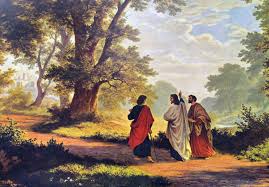
Scripture
“And Jesus said to them, “Follow me, and I will make you fish for people. Immediately they left their nets and followed him.” Matthew 4:19-20 (NRSV)
Letting Go
The story of Jesus calling his first disciples always amazes me. These fishermen were hard at work the day Jesus called them into ministry. Andrew and Peter were casting out their net, and James and John were mending theirs. Yet, it was precisely then that Jesus said the words, “Follow me.”
Jesus called them while they were working, and all of them let go of what they were doing and followed him. They followed immediately Scripture tells us. And they would soon find out that following Jesus would mean more than just letting go of their occupations. It would mean letting go of their family, their friends, and the dreams they surely had for their lives.
From a human perspective, following Jesus did not offer many rewards. But they chose to let go earthly rewards, to gain the eternal rewards Jesus promised.
This concept of letting go, of giving up the things we normally do, to do something new, and gain greater rewards, is true in all areas of life. A comfortable retirement requires letting go of some things we may want right now. Good health requires letting go of certain foods and a sedentary lifestyle. More time with our children, may mean letting go of a well-earned promotion that would offer a better income, but keep us from our family.
And a deeper relationship with God, means prioritizing our time, so we have the time to pray, read the Bible, or serve others as God has called us.
In the end, the rewards we choose will depend on what we value the most. Which is the greater reward? Extravagance now, or comfort in our later years? Junk food, or lower cholesterol? More money in the bank, or a good relationship with our children?
Where our relationship with God is concerned, it is also about what we value most, and what rewards we seek. In the end, we must answer the same question that the first disciples did: Are we willing to let go of the things we normally do to gain the greater rewards of following Christ?
Questions for Reflection
- Do my priorities reflect earthly values or heavenly values?
- Does my use of time reflect a close relationship with my Creator God?
- What is one change I could make this week that would help me spend more time in prayer and Scripture reading?
Prayer
Loving God, Risen Savior, you call each of us to follow you. Give us the wisdom to esteem heavenly values and a closer relationship with you, and give us strength and courage for each day; so that our lives reflect your love and light in this world. In Christ’s name. Amen.



 RSS Feed
RSS Feed